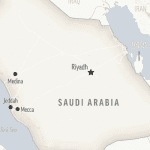 Human Rights Watch said Saudi Arabia has executed 48 people so far in 2018, half of them for non-violent drug crimes.
Human Rights Watch said Saudi Arabia has executed 48 people so far in 2018, half of them for non-violent drug crimes.
Many more people convicted of drug crimes remain on death row following convictions by Saudi Arabia’s notoriously unfair criminal justice system.
The Death Penalty Worldwide Database, which collects information on executions across the globe, shows that Saudi Arabia has one of the highest execution rates in the world and applies the death penalty to a range of offences that do not constitute “most serious crimes,” including drug offences, adultery, sorcery, and apostasy.
Saudi Arabia trails only Iran in the Middle East in in the number of its executions.
Human Rights Watch opposes capital punishment in all countries and under all circumstances. Capital punishment is unique in its cruelty and finality, and it is inevitably and universally plagued with arbitrariness, prejudice, and error.
In 2013, following similar resolutions in 2007, 2008, and 2010, the UN General Assembly called on countries to establish a moratorium on the use of the death penalty, progressively restrict the practice, and reduce the offences for which it might be imposed, all with the view toward its eventual abolition. UN Secretary-General Ban Ki-moon has also called on countries to abolish the death penalty
In an interview with Time Magazine last month, reformist Saudi Crown Prince Mohammed bin Salman said in a few areas Saudi laws can be changed to life in prison sentences instead of executions.
Sarah Leah Whitson, Middle East director at HRW, said: “Any plan to limit drug executions needs to include improvements to a justice system that doesn’t provide for fair trials.”
Saudi Arabia has gone through a series of reforms in the last year, but international human rights groups urge the kingdom to make changes to its treatment of human rights advocates, to stop executions and cancel its pervasive system of male guardianship.
Saudi Arabia has carried out nearly 600 executions since the beginning of 2014, over 200 of them in drug cases, HRW said.













